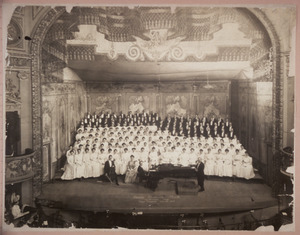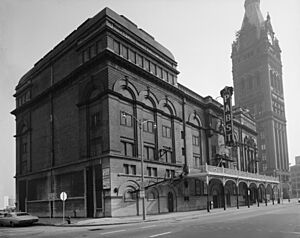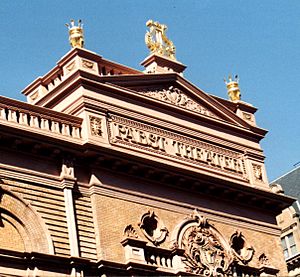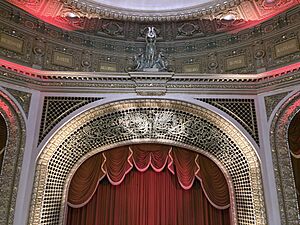Pabst Theater facts for kids
|
Grande Olde Lady
|
|
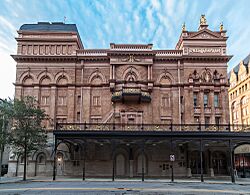
The theater's south façade as seen in 2012
|
|
| Full name | Captain Frederick Pabst Theater |
|---|---|
| Address | 144 E Wells St Milwaukee, WI 53202-3519 |
| Location | East Town |
| Public transit | |
| Owner | Pabst Theater Group |
| Operator | PTG Live Events |
| Capacity | 1,339 |
| Construction | |
| Broke ground | December 1894 |
| Opened | November 9, 1895 |
| Renovated | 1928, 1976, 1989, 1998, 2002 |
| Construction cost | $300,000 ($10.1 million in 2022 dollars ) |
| Architect | Otto Strack |
| Website | |
|
Pabst Theater
|
|
| Architectural style | German Renaissance Revival, Late Victorian |
| NRHP reference No. | 72000063 |
| Significant dates | |
| Added to NRHP | April 11, 1972 |
| Designated NHL | December 4, 1991 |
The Pabst Theater is a famous place in Milwaukee, Wisconsin, where people go to watch shows and concerts. Many people call it "the Pabst." It hosts about 100 events every year. Built in 1895, it is one of the oldest theaters in the United States that has been open continuously. Many famous performers have appeared here, like pianist Sergei Rachmaninoff and actor Laurence Olivier. Today, big music stars also perform at the Pabst.
The Pabst Theater is known for its beautiful, fancy design. It also played an important part in the German-American culture in Milwaukee. It is officially recognized as a City of Milwaukee Landmark and a State of Wisconsin Historical Site. In 1991, it was also named a National Historic Landmark. People sometimes call it the "Grande Olde Lady" because it is the oldest theater in Milwaukee's theater district.
The Pabst is a traditional theater with a proscenium stage, which means the audience looks through a large arch at the stage. It has two balconies and can hold 1,300 people. The theater hosts about 100 events each year. These events include music, comedy, dance, opera, and plays. The stage also has a special hydraulic orchestra pit that can move up and down. This makes it great for almost any type of show.
The main seating area, called the auditorium, is shaped like a drum. It is decorated in red and maroon colors with gold and silver details. A huge, 2-ton Austrian crystal chandelier hangs above the audience. The theater also has a grand staircase made from white Italian Carrara marble. The proscenium arch around the stage is highlighted with shiny gold leaf.
The theater has a historic organ. This organ used to play music for silent films. It is a large instrument with 4 keyboards and 20 sets of pipes, made by M.P. Moller.
Contents
History of the Pabst Theater
The story of the Pabst Theater began in 1890. A famous brewer named Frederick Pabst bought an opera house called the Nunnemacher Grand Opera House. He renamed it Das Neue Deutsche Stadt-Theater, which means "The New German City Theater."
Fires and Rebuilding
In 1893, the theater was damaged by a fire. Then, in January 1895, another fire completely destroyed it. Frederick Pabst quickly ordered it to be rebuilt. The new theater, which we now know as The Pabst Theater, opened later in 1895.
Design and Style
The Pabst Theater was designed by architect Otto Strack. He designed it to look like the grand European opera houses. It was built in the German Renaissance Revival style. Strack made sure it was one of the safest theaters from fire in its time. He also made it one of the most beautiful and fancy.
German-American Culture
The Pabst Theater was very important to the German-American community in Milwaukee. In the early 1900s, Milwaukee was known as Deutsch Athen, or "German Athens." For many years, the theater showed plays and performances in German. However, by 1918, it started scheduling shows in English because fewer people were attending the German performances.
Renovations and Updates
The Pabst Theater has been updated several times over the years. The first big renovation happened in 1928. In 1976, after a period of decline, it was carefully restored to look like its original design. In 1989, a covered walkway, called a colonnade, was added. This walkway connected the theater to the Milwaukee Center.
The most recent major renovations took place in 2000. This happened after the Pabst Theater Foundation bought the building. Michael Cudahy helped start the fundraising by giving $1 million. The work included adding two elevators and more public restrooms. They also replaced some seats and improved the air system. A new pub, Cudahy's Irish Pub, was also added in a larger lobby area.
The Pabst Theater was designed to be like the best German Opera Houses. Because of this, its acoustics (how sound travels) are excellent.
Cool Features and Technology
Otto Strack included many new technologies when he designed the Pabst Theater. It had one of the country's first fire curtains. This curtain could drop down to block the stage in case of a fire. It also had all-electrical lighting, which was very modern then. An early air conditioning system used fans and large amounts of ice to cool the building.
The theater also had an electric organ, which was a new idea at that time. The Pabst is thought to be the first theater in Milwaukee to use a counterweight system. This system helps to easily lift and lower scenery on the stage. It was installed after World War I and is still used today.
Other Uses and Events
The Pabst Theater is not just for concerts and plays. In 2016, a documentary film called A Billion Lives had its first showing in North America at the Pabst. In 2017, another film, Batman & Jesus, by Milwaukee native Jozef K. Richards, also premiered there.
Famous Names on the Walls
If you look closely inside the Pabst Theater, you will see names of 15 famous artists. These names are carved around the top edge of the drum-shaped auditorium. They include writers like Ibsen, Wagner, Molière, and Goethe. You'll also find names of ancient thinkers like Aristotle and Thespis, and artists like Michelangelo and Raphael. Famous playwrights like Shakespeare and actors like Garrick are also honored. The names of composers like Beethoven and even a renovator, Bernard O. Gruenke, are there too.
See also
 | Aurelia Browder |
 | Nannie Helen Burroughs |
 | Michelle Alexander |


